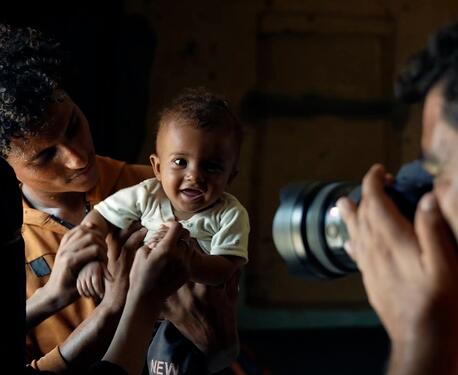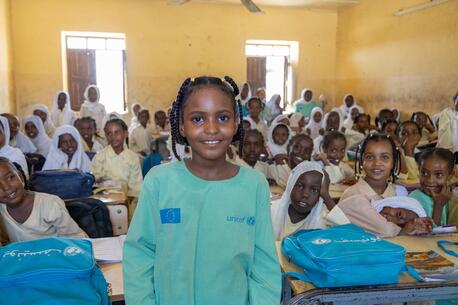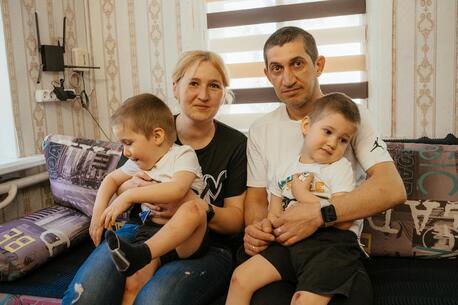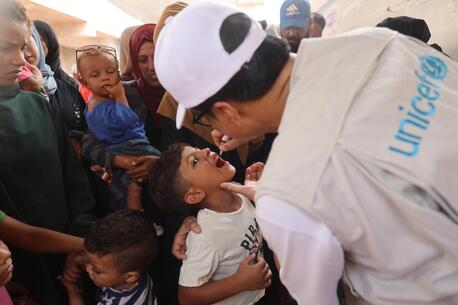
How UNICEF Fights Malnutrition in Yemen
Photographer Ala'a Noman chronicles the lives of children being treated for severe acute malnutrition in Yemen, where nine years of conflict have exacerbated an ongoing malnutrition crisis.
More than half of Yemen's population needs humanitarian assistance
It was in 2015, not long after the start of Yemen's devastating civil war, that photographer Ala'a Noman decided to focus his lens on the plight of ordinary Yemenis caught in diffficult circumstances.
Nine years later, Yemen remains one of the world's largest humanitarian crises. Conflict and violence have pushed families into deprivation, deepening an ongoing malnutrition crisis. An estimated 500,000 children are severely malnourished; nearly 49 percent of the country's children suffer from chronic malnutrition, which can have irreversible consequences, stunting growth and cognitive development.
Six months ago, Noman began documenting the daily lives of children recovering from severe acute malnutrition and their mothers, checking in on them regularly at home and in UNICEF-supported health centers and hospitals.
"I was moved by their stories," he says, "especially as I followed every moment of their suffering and relief."
"Since the beginning of the war in Yemen, I have focused on the situation of the people, with the hope that one day peace and prosperity will prevail," Noman says. "For me, it was a shock to know that malnutrition can lead to death. How can a child die due to malnutrition! I did not know how serious the issue is. People need to know more about the seriousness of this condition. No one should neglect this."
UNICEF is the world's largest distributor of Ready-to-Use Therapeutic Food for the treatment of severely malnourished children
Every year, UNICEF procures, purchases and distributes an estimated 75 to 80 percent of the world's supply of Ready-to-Use Therapeutic Food (RUTF), a nutrient-packed, shelf-stable peanut paste, reaching millions of severely malnourished children in dozens of countries with this lifesaving treatment.
In 2023, UNICEF screened more than 4.5 million children under 5 for malnutrition in Yemen. Between January and September 2023, over 288,600 children with severe acute malnutrition were identified and admitted to UNICEF-supported therapeutic feeding programs. UNICEF also provides children with supplements and micronutrients and offers parents guidance on meeting children's dietary needs. During that same time period, more than:
- 2.1 million children received vitamin A supplements
- 1.2 million children received micronutrient sprinkles
- 999,500 children received deworming tablets
- 1.3 million mothers received iron folate acid supplements
- 3.1 million mothers received infant and young child feeding consultations
Safe water and sanitation services are essential to prevent malnutrition
Unsafe water and sanitation can lead to malnutrition or make it worse. UNICEF works with partners to shore up Yemen's damaged water and sanitation infrastructure. "Unclean water sources ... cause diarrhea and lead to health problems for children," says Noman. "This is what I learned while documenting these stories."
In 2023, UNICEF provided safe water for drinking and domestic use to more than 1.6 million people and improved access to sanitation for more than 1.9 million people across Yemen.
The current situation in Yemen is not easy, but it's never been easy in Yemen. We, as UNICEF, wherever we are in the country, are determined to stay and deliver. — UNICEF Representative in Yemen Peter Hawkins
"UNICEF is all over the country in every governorate, working hard on water, sanitation, health care. We are working in 2,900 health facilities across the country to give services to children wherever they might be," says UNICEF Representative in Yemen Peter Hawkins. "The current situation is not easy, but it's never been easy in Yemen. We, as UNICEF, wherever we are in the country, are determined to stay and deliver."
Your support can help UNICEF reach more children in need. Please donate.
HOW TO HELP
There are many ways to make a difference
War, famine, poverty, natural disasters — threats to the world's children keep coming. But UNICEF won't stop working to keep children healthy and safe.
UNICEF works in over 190 countries and territories — more places than any other children's organization. UNICEF has the world's largest humanitarian warehouse and, when disaster strikes, can get supplies almost anywhere within 72 hours. Constantly innovating, always advocating for a better world for children, UNICEF works to ensure that every child can grow up healthy, educated, protected and respected.
Would you like to help give all children the opportunity to reach their full potential? There are many ways to get involved.





